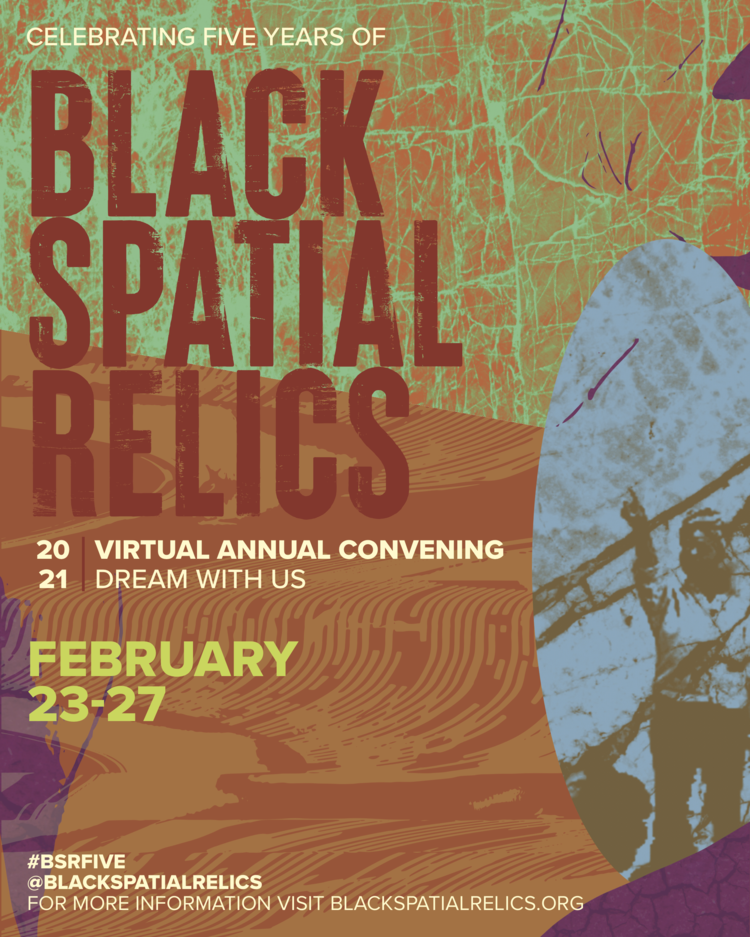 Presented by Black Spatial Relics
Presented by Black Spatial Relics
Facilitated by Arielle Julia Brown
February 23rd-27th 2021
ZOOM & HowlRound Livestream
Black Spatial Relics on Facebook
Review by Afrikah Smith
ZOOM — Working towards a future for Black creative spaces that foster exploration, community, and liberation, Black Spatial Relics (BSR) hosts their second annual convening in celebration of their five-year anniversary. Running February 23rd to February 27th, the Black Spatial Relics Annual Convening is free and open to the public.
At its February 25th session, Black Spatial Relics presented three workshops hosted by 2020 BSR artists-in-residence Danielle Deadwyler and Ada Pinkston, and guest artist Angel Edwards.
In the first workshop, Deadwyler shared her documentary busitopen. Exploring Black womanhood and motherhood through the lives of four Black women, Deadwyler juxtaposed the repetition of sound, movement, and various historic images of working class Black women. Through each woman’s relationship to labor and love, Deadwyler focused on the practices of recollection, ritual, and their significance.
The workshop was an ongoing conversation with Deadwyler on how to further develop movement and gesture into the performance aspect of her work. After each segment, participants discussed moments, movements, and gestures that struck them and engaged their senses, bringing up memories, experiences, and revelations related to resistance, tradition, and legacy.
Following along to the second workshop, Pinkston presented their performance work-in-progress that was in conversation with Lucy Jackson. After being emancipated from slavery, in 1886 Lucy Jackson (formerly the head of housekeeping for Ridgley at the Hampton Mansion) sued former slave-owner John Ridgey for the return of her “6 common dresses, 9 good dresses, 4 silk dresses, furs, Muff and other articles of great value.” With no existing photos or extensive archival historical record of Lucy Jackson outside of the court case demanding her belongings be returned, there is not much known about Lucy’s life nor if she ever received her property. Pinkston made note of how specific Lucy Jackson’s request was, and intrigued by the question of “what do we have in the archives of the visual adornment of black women?” Pinkston added, “…the aesthetic of really feeling yourself and how does it make us feel?”
Prompting participants to close their eyes, she asked them to think about their favourite outfit and how it made them feel. Pinkston asked participants to write their experiences and surprised them afterwards with the challenge to put on their outfits. After giving time for everyone to change into their outfits, Pinkston encouraged participants to share what they wrote in response to the prompt. Some participants responded feeling seen, vulnerable, alive, and more when wearing their outfits, sharing and describing their outfits with smiles and joy. In their adornments, Pinkston asked everyone to stay on camera for a dance party.
After 10 minutes, Pinkston collected everyone back onto their screens to close the workshop. Before posing her last questions, Pinkston revealed everything shared at the workshop would create a love letter to Lucy Jackson: If you could tell Lucy Jackson one thing, what would you tell her? If you could ask Lucy Jackson one thing, what would you ask her?
Angel Edwards hosted the final workshop featuring a Caribbean Zine presentation. Edwards curated a space that focused on the otherworldly, almost church-like experience in gathering, the workshop shared offerings from Caribbean artists Tahnee Jackson, Charlyn Griffith-Oro, Angela Salmon and Nikolai McKenzie Ben Rema. On themes around loss, family, and traditions, the hour long event was a spiritual and communal experience to bond with the artists and attendees, holding space for questions like “what feels like the touch of god? What feels divine?”
I felt seen in the workshops that Deadwyler, Pinkston, and Edwards presented and glad that I was able to be in a community with brilliant Black scholars and artists for a day. Pinkston’s workshop impacted my view in the practice and significance of adorning oneself, and creating the intentional space to do so. Meanwhile, Deadwyler and Edwards’s workshops made me reflect on the maternal figures in my life and their relationship to labor, love, and passing on family legacy and traditions. Sitting with it all, I felt affirmed in a way that I haven’t felt before and look forward to attending again in the future.
Founded in 2016 by Arielle Julia Brown, Black Spatial Relics started as a national residency program that supports the development of new performance works that engage with the intersections of the public history of slavery, contemporary issues of justice, and Black freedom. By 2019 Black Spatial Relics produced its first convening, featuring a performance showcase, artist talk, workshops and think tank. Offering a variety of artist talks and workshops, Black Spatial Relics invites the public to be in community with Black scholars and performance makers, sharing their joys, hopes, and visions of freedom.
To learn more about Black Spatial Relics, visit https://www.blackspatialrelics.org/.
